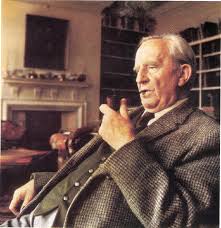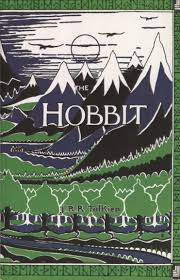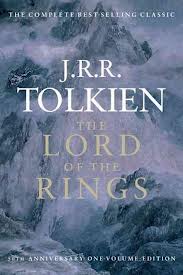(Editor’s Note: Alex recently decided to sit down and re-read the collective works of Middle-Earth by J.R.R. Tolkien. Given that one of our editors is a (self) renowned Tolkien scholar, Alex will be discussing the works with Travis both before and after reading them. This will be Part One of a series that should appeal to approximately five people, all of whom are already bored by our discussions. You’re welcome, Earth.)
Alex: Once upon a time I was an enormous nerd about the world of J.R.R. Tolkien. I was 14 (or so) and read all of The Hobbit, The Lord of the Rings, and The Silmarillion in one calendar year. The Atlas of Middle-Earth (what ever happened to my copy of that?) was my constant companion, and the first installment of Peter Jackson’s cinematic adaptation hit theaters. The stories grabbed my attention, the deep fantasy world held it, and the themes of sacrifice, ingenuity, and courage seemed timeless.
Then…I dropped all of it. I still saw the movies when they came out in subsequent years, but my mania had subsided. Then, as now, my interests seem to come in waves. I was deeply into high fantasy in that time, to be sure. Hell, I read about a dozen of the execrable Drizzt Do’Urden novels by R.A. Salvatore because they were fantasy novels and, well, that was enough. But, like I said, I moved onto something else. If I remember the timeline right it may have been my Wes Anderson-inspired dive into cinema. In any case, I left Tolkien behind and didn’t read any of his work again until just this past month.
Over the past two years or so I’ve been reading a lot of books related to the medieval period over the past few years, including some of the old mythic texts that had inspired Tolkien. Texts like Beowulf, The Poetic Edda, and The Sagas of the Icelanders are archaic and strange to modern literary sensibilities , but I found them entrancing. The staccato flow of alliterative verse, the ancient & barbaric world-view, and the depiction of a world too strange, dark, and mysterious for any man to feel truly the master of it. I knew that Tolkien drew upon these writings when creating his own work, so I decided to work through his legendarium again.
Admittedly, I’ve already read The Hobbit again, but I’ll sit on that for now. As a dedicated (to put it lightly) Tolkien reader, what should I be looking for as I dive into his writing after more than a decade away?
Travis: I can’t go any further before calling out your reading the Salvatore novels. Really? An entire world of fantasy literature to choose from and you chose that?! Your younger self brings you shame in this world.
I speak as a Tolkien reader of the utmost devotion. I read the books each year, I pour over notes and minutia as though I were studying it for graduate dissertations on the political structure of Eriador in the late 3rd Age, and I can recite entire chunks of the movies (if not the movies entire).
And I keep discovering new things. All the damn time. Combined, Lord of the Rings is only around 1200-1400 pages long, depending upon which publishers version you are reading. The Hobbit is even shorter. We’ll not get into the Biblical-style prose of The Silmarillion. And then there’s other, lesser known works like Book of Lost Tales, Farmer Giles of Ham, Children of Hurin, and his translation works. Tolkien is nothing if not dense, wearing his influences on his sleeve.
Tolkien was writing a mythology for Britain that didn’t exist apart from the Arthurian legend, so there’s a great deal of Joseph Campbell mythbuilding (though Campbell came after Tolkien) at work here. Many common fantasy tropes established in modern high fantasy through his works (the wizard Gandalf arriving and departing mysteriously, dwarves living under the earth, dragons being greedy) are distillations of earlier works such as The Kalevala, the Germanic legends of Siegfried, and Scandinavian myth. There’s a book on my shelf at home called Tolkien’s Ring (or something of that nature) that really breaks down the individual components of how the world of Middle-Earth was created, where it came from, and where Tolkien adapted and modified his influences. It’s a fascinating read that would be made better if the book weren’t a coffee-table sized tome. Consequently, as you read through, really take the time to look over how each page has sprung from some other source. If the postmodern screed that there are no new original stories anymore is true, then Middle-Earth stands as a prime example. (But then, Tolkien never hid his influences)
Other things to look for, as you read through in the order I presume you’re doing, is how the world and storytelling evolve. Obviously, The Hobbit and Lord of the RIngs are vastly different books (something that seems to surprise fans of the movies only), yet even apart from the differences in style, you can see the world evolving from page to page almost. Names like Gondolin and Moria are dropped almost casually in The Hobbit, yet there’s a sense that there’s not much to back them up beyond the rough sketches Tolkien had been composing since the 1920’s (“The Lay of the Fall of Gondolin”, to be precise). Good ol’ J.R.R. was working on these stories, revising them almost continually, until the day he died – a true completion-ist would look into reading Christopher Tolkien’s A History of Middle-Earth, though having read the first volume, I can say that it’s a slog.
So, those are some things you can look for. What are your thoughts about coming back to Tolkien? And having completed The Hobbit, what have you noticed so far? Things you haven’t seen before/don’t remember? Thoughts on the story?
Alex: In my defense, I had bought the Icewind Dale video game and liked it enough to buy another thing with that title and then entropy took hold. At least I didn’t read all of The Wheel of Time! This is my smallest victory over you.
The elements from medieval legends are probably my main reason for re-reading Tolkien, so I’ll definitely have my eye out for that. It’s always intrigued me that he essentially created the high fantasy genre as an exercise in self-conscious myth-making. Like I said, I’ve been going through a lot of those ancient texts and found them deeply appealing. There’s a refreshing darkness and fear in those pagan poems and sagas. For all the confidence and braggadocio of the warrior protagonists in those works the narrative world I encountered was one of fear, cold, and death. The heroes (hell, even the gods themselves) struggle, maybe achieve some victories, but succumb to death in the end. It’s all very good Bean-fodder.
By contrast, I am generally bored by the arch-typical “hero’s quest” stories in high fantasy (and its cousin genre of sci-fi for that matter). Maybe it’s just because it’s so overdone in today’s popular culture, but the adventures that Bilbo and Frodo go on in Tolkien’s works seemed very rote in my memory. In a sea made up of the numbingly repetitive travails of Spider-Man, Batman, Superman, the Doctor, various Skywalkers, the Avengers, and on and on. I find it hard to care the vast majority of the time in those stories. The appeal of such stories seems to be the spectacle of how our given protagonist will succeed, which is frankly quite uninteresting to me. Even worse, those heroes are often in conflict with some kind of implacable evil forces that are out to destroy the city/world/universe/life/time/whateverwhoevencaresthesestakesaresostupidlyhigh, which is profoundly uninteresting to me. Unmotivated evil is just…ugh. Just tell people to go read the Bible if you’re going to be that boring.
That being said, I really enjoyed reading The Hobbit last month. Bilbo’s journey was certainly generic in a lot of ways, but I’m willing to forgive that when the novel in question is a kid’s book that is quite literally creating the genre. In a lot of ways, reading this again was quite the romp. The way Tolkien flings new and varied challenges at Bilbo with every chapter is a lot of fun. He makes Bilbo rely on his wits more than anything, but the little guy gets several moments of legitimate glory as well (which is one of Tolkien’s favorite themes as I recall). It also helped that the stakes were never ludicrously high. Lives were at stake, sure, but not the lives of everyone. Which is nice.
I also really enjoyed the way Tolkien’s narration moves the action along. His tone is something like pleasantly sardonic, which is really damn difficult to pull off without interrupting the action. It reminded me of the style of the Icelandic Sagas in a lot of ways, employing that signature Nordic understatement and detachment to great effect. But that tone doesn’t carry though to the rest of his work, right?
Anyway, my biggest concern when I wade back into The Lord of the Rings trilogy is butting up against a drier narration and higher stakes. Are those concerns justified?
Travis: Please, don’t remind me about Wheel of Time. And to be fair, the first six books were cool, followed by the sheer visceral feeling of reading books 12-14.
I tend to agree with you as far as the hero’s quest being an overdone trope in modern media. Where I differ from you is that I’m an unabashed fan of the storyline…when it is told well. This is why the first two Star Wars movies succeed, as well as Return of the Jedi as far as Darth Vader’s storyline is concerned; the idea of good triumphing over evil is played out on a grand scale with interesting twists and turns. The same goes for the Lord of the Rings movies, several of the first Iron Man movies, and Nolan’s Dark Knight trilogy (well, the first two, at least). What also helps is when the spectacle is so overwhelmingly huge and involving that it accents the story – again, the story must be told well before anything else. This is why The Avengers works so well, and why I have high hopes for Guardians of the Galaxy. When it fails, or when the action does not successfully overcome the narrative or it’s just not that involving, you get movies like the latest Thor movie – a story where you don’t care about the villain and there’s never any doubt that our hero will make it out alive. (This is why I’m more excited about Captain America: The Winter Soldier; in addition to the highly interesting use of iconography on an academic level, the storyline deals with friendship and betrayal rather than another faceless villain attacking the Good Ol’ USA)
One of the reasons I’ve always loved The Hobbit is for the prose styling which you’ve mentioned before. In order to place it into my understanding of Tolkien’s meta-narrative, I usually construct it as Bilbo telling the story to young Frodo, or whichever young hobbits happened to be listening. (Another reason I love The Fellowship of the Ring movie is because we see Bilbo doing just that at the party scene in the beginning) Since Tolkien was effectively writing the story for children, it makes sense, yet there’s enough of the old sagas in there to keep adults interested.
I find it interesting that you reference drier narration as a concern when you’re a fan of the Icelandic Sagas, something that I’ve failed to really get invested in on multiple occasions because of, well, dry narration. Lord of the Rings certainly falls victim to large passages of text that describe the tapestries on the walls of Edoras, but most of these passages are the result of dedicated world building. When Aragorn, Gandalf, Legolas, and Gimli ride up to the city of the Rohirrim, they specifically give mention to the burial mounds of the kings and their ordering, lending a sense of history to this fascinating race eking out a living on the grassy plains of Middle-Earth. Then again, maybe I just find this fascinating, while you find your interests elsewhere.
The stakes are raised to the conditions that you decry, yes. However, they’re different for different people. Frodo and Sam are trying to save their home (the Shire); Gandalf is fighting a battle against a foe that’s been tormenting and corrupting Middle-Earth for millennia; Aragorn is fighting against the evils of his ancestors – something that Peter Jackson actually improves upon in the movies, in order to give him more of a journey. What’s most interesting, though, is the idea that several people don’t actually have a stake in the battle, specifically the Elves – win or lose, they’re leaving Middle-Earth, and are only aiding the cause because leaving men to wage a losing war against Saruman would be just about the ultimate dick move.
As far as faceless villains go, Sauron certainly falls victim to this…but in Lord of the Rings only. When you add in The Silmarillion, you get more of a Biblical sense to his conflict. When Melkor tries to add in his conception of how the world should be (a very human trait – we always try to shape our surroundings to our own liking) he finds himself on the outside looking in; embittered, he is continually trying to shape his own world, though in spite, it becomes a twisted, corrupted version of what Illuvatar originally wished for. Sauron gets pulled along for the ride for much of The Silmarillion; drunk on power, he becomes Morgoth/Melkor’s greatest servant. After the end of the First Age, he’s on the verge of repentance, but doesn’t want to give up his throne. (Like Nixon) Thus, he continues to rail against the peoples of Middle-Earth, trying to shape his ultimate vision of the world, one that he alone has made.
What I’m saying is, yes the narration is drier and the stakes are larger, but at their core is a very human sense of motivation. Then again, it’s all subjective as to whether one enjoys that or not. On the plus side, Tolkien grounds much of the narrative with the hobbits, interjecting their plain take on the world, and bringing about several humorous moments. (My personal favorite comes in Return of the King, after Aragorn heals Merry in the Houses of Healing. While the humans take a moment to collect themselves and come around, Merry instantly sits up and states that he is hungry. I laugh every time.)
So, there it is. Read away, and enjoy Fellowship of the Ring. As you read, I suggest that you think of the first volume as an ode to a passing world – one that Tolkien is showcasing for the last time as far as the history of Middle-Earth is concerned. Going through Moria and Lorien, the Fellowship observes the kingdoms of two races who will soon make way for the coming of men. There’s a very melancholy sense to the entire proceedings if you choose to look at it through that lens.
On the other hand, if this bores you, then…my words become nothing at the thought of this. Enjoy!








